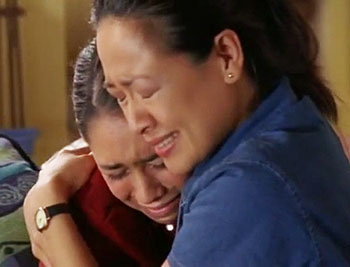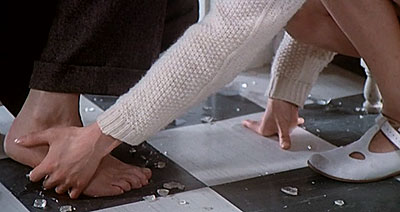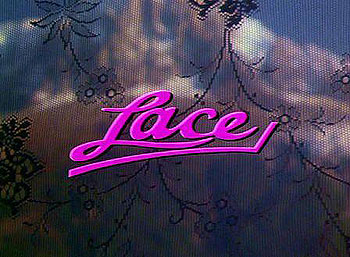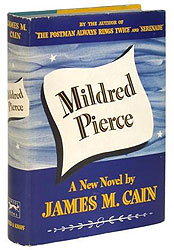Mixed Up Confusion
Published on June 13th, 2012 in: Music, Teh Sex |By Paul Casey
Since I was seven years old, I have absorbed music through compilations. Obsessive ordering and fear of the new drove it. Mixtapes, playlists, and mash-ups took new sounds to my brain. A new album was orgy time, and the chance of stumbling into some serious bad orifice play was too great. Eye up the single, cruise the opening seconds, and make camp. Listen for the transitions. Synths that keep going. Or cheat and crossfade that sucker. Yes, I made mixtapes for passive-sexual purposes. Passive-aggression? Naturally.

Those Crazy (?) Canadian Kids: A Grudging Appreciation Of Degrassi
Published on May 30th, 2012 in: Canadian Content, Issues, Teh Sex, True Patriot Love, TV |By Maureen
I can’t believe I even suggested I write this. I don’t watch Degrassi. I don’t care about Degrassi. I am too old and too not-Canadian to have grown up with it and find it endearing. I openly mock it and still remind everyone Drake was once Aubrey Graham.

Manny Santos hugs her mom
That said, my friends did go through a post-college, pre-full time employment period of watching the shit out of Degrassi. During the marathons I unwittingly experienced, there was one thing I noticed that I did find impressive.
(more…)
What Is The Deal With Lana Del Rey? A Timeline
Published on February 2nd, 2012 in: Critics/Criticism, Feminism, Media, Music, Teh Sex, The Internets |I never even heard of Lana Del Rey until I saw this posted on a friend’s Facebook wall on January 14: “What is this Lana Del Rey shit?”

It was, of course, a reference to that infamous, scandalous, controversial, polarizing (pick one or come up with your own) Saturday Night Live performance. I don’t watch SNL so I didn’t see it.
The next day, January 15, another Facebook friend posted a link to Lana Del Rey’s video for “Born To Die.” I listened to it. I loved her voice and I thought the song was rather intriguing and different. Del Rey was certainly beautiful, with a distinctive look and sound. I watched a few more videos of hers “Blue Jeans,” “Video Games,” and “Mermaid Motel.” They were all good.
Then I started reading online about the backlash before the SNL backlash. How Del Rey was an indie poseur, blah blah blah. I felt bad for the poor girl. I felt like if everyone was going to hate on her, I was going to like her just to spite people. (I can’t help it; it’s what I do.)
Other than posting a link to the “Born To Die” video on my own Facebook wall and a link to the January 16 Brian Williams email article on Gawker, I have not posted much about her online. Yet I couldn’t escape the haterade that everyone on the Internet seemed to be drinking. It was everywhere I looked and I wasn’t looking for it. Within about a week, she came up in a real-life conversation and that’s when I started Googling her.
New York Magazine‘s Entertainment section has a nice timeline of events that you can check out here. I admit it looks like I’m copying them with my own timeline below, but mine is a bit different.
Rather than try to dissect and comment on each and every blog post I’ve read about Lana Del Rey (which would surely require at least a week and I do have other things to do) or even the ones I’m linking below, I’m just going to include some salient quotes and let you be the judge.
At this point, you’re going to think what you want to think about Lana Del Rey so maybe you’re thinking “why bother?” I will point out that these links are available to everyone with a computer and an Internet connection. It seems like people (including music blogs and others) are content to follow the meme of the moment without questioning it (or the biases of the blogosphere, much less their own biases) or even doing their own research. I wanted to do my own research and decide for myself. So here you go.
Prince’s Dirty Mind
Published on January 30th, 2012 in: Issues, Music, Oh No You Didn't, Teh Sex |By Paul Casey
Those who are only familiar with Prince as a traveling hits tour; one who thinks that Biblical coincidence—hello! 3121 perfume—is a guarantee of good business; and who makes deranged cultish put-downs of homosexuality and his old friends may not be aware that he was once something else. Some omni-sexual thing that was an expert in transgressive pop music and performance. Some deviant, perverted thing that ejaculated guitar semen onto his audience. Some ballsy twentysomething who wore black underwear and a trench coat to a Stones concert. Some kind of genius.

Photo © Blonde Peterson
From 1978’s “Soft and Wet,” the only sign of Prince’s genius on his debut For You, sex was the thing. Indeed, even now a decade following the misunderstood Jehovah’s Witness tribute The Rainbow Children, sex is still the thing. While most casual fans of Prince are aware of the mention of used Trojan condoms in “Little Red Corvette”—a song and line which is still performed today—or what “Cream” refers to (also still performed), there is a depth of perversion in his music which passes many by.
Prince’s sexual creativity touches areas which make even his longtime fans uncomfortable, including rape, incest, and turning lesbians straight. It has also turned out some of his greatest songs. This is an introduction to and celebration of that work.
Homesick For Sadness: The Night Porter
Published on December 5th, 2011 in: Dancing Ourselves Into The Tomb, Issues, Movie Reviews, Movies, Teh Sex, Underground/Cult |
As a film exploring the sadomasochistic relationship between a former Nazi officer and a concentration camp survivor, The Night Porter has received its share of controversy. In an article about The Night Porter called “Ideas of Sex,” writer and film scholar Nick Impey describes how its “detractors accused [director Liliana] Cavani of exploitatively using the Holocaust as a backdrop for salacious spectacle.” At times, watching The Night Porter feels less like an erotic journey than a particularly gore-free horror movie. It is frequently almost difficult to watch. Yet, persistence provides evidence that The Night Porter is not “Nazi porn” but an examination of the grey areas in a black and white world.
Sick And Sin: The Allure Of Lace
Published on July 30th, 2011 in: Feminism, Issues, My Dream Is On The Screen, Teh Sex, TV |
“Incidentally, which one of you bitches is my mother?” has become an iconic piece of television history, especially to anyone who grew up in the 1980s. This infamous line of dialogue—spat, rather than spoken, by Phoebe Cates—from the 1984 TV miniseries Lace, is hardly the most ridiculous thing that takes place during one of the most notorious television miniseries.
The Mistress And The Maid: Mildred Pierce
Published on March 30th, 2011 in: Back Off Man I'm A Feminist, Books, Culture Shock, Feminism, Issues, Movies, Teh Sex, TV |By Less Lee Moore

When I learned of the Mildred Pierce miniseries—directed by Todd Haynes and airing on HBO—I was thrilled. I’ve been a longtime fan of the novel and film, as well as of Haynes. Then I started to second-guess my excitement.
Would another male-directed version of this story merely intensify the story’s “male gaze”? Furthermore, should I revere Mildred Pierce as a feminist text when the original novel was written by one man (James M. Cain) and first captured on screen by another (Michael Curtiz)?
(more…)
Fetish Art And Feminism
Published on March 30th, 2011 in: Art, Back Off Man I'm A Feminist, Feminism, Issues, Teh Sex |By Kai Shuart
Recently, I finished reading Craig Yoe’s Secret Identity: The Fetish Art of Superman’s Co-Creator Joe Shuster. Yes, it’s true. Even though I’m as much of a feminist as you’re likely to meet, I also love fetish and pinup art. I say this not to claim definitively that pinup or fetish art is feminist; I’m too well aware of the incongruity of these two things to make such a bold claim. Rather, I state my identity as pinup fan and feminist to remind everyone that feminism is not a monolith—it comes in many different varieties. I also state these seemingly contradictory positions to remind everyone that our desires know no political affiliation. We all have fantasies that we can’t explain for the life of us.
(more…)
Sing It, Sister? An Eve Ensler Comparison
Published on March 30th, 2011 in: Back Off Man I'm A Feminist, Books, Feminism, Issues, Teh Sex |By Maureen

I first read The Vagina Monologues when I was in late adolescence and thought it was brilliant. Eve Ensler’s collection of stories and vignettes made me proud to have a vagina and to know that other women had similar experiences with menstruation, first-time tampon use, annoyance at “feminine itch” commercials, and so much more. I saw a performance of the Monologues at my college during which not only did my recently discovered distant cousin perform a monologue, but one of the professors at my university also simulated a rollicking orgasm.
As a young person just discovering ideas of sexuality and feminism, I was in such awe of Ms. Ensler ad her ability to ask the uncomfortable questions, publish the painful stories, and organize a foundation to help women who don’t have opportunities to be as bold as those of us who don’t live in fear of being stoned to death for mentioning sex or showing skin.
(more…)
A Little Bowie, A Little Bardot: The Runaways
Published on March 30th, 2011 in: Back Off Man I'm A Feminist, DVD, Feminism, Issues, LGBTQ, Movie Reviews, Movies, Music, Teh Sex |The Runaways, Floria Sigismondi’s 2010 film about the seminal all-girl rock band, is not a documentary. That role, to some extent, has already been filled: Former Runaway Vicki Tischler-Blue made Edgeplay: A Film About The Runaways in 2004, even though Joan Jett declined to participate and refused to allow any original music from the band to be used.
Despite the fact that Joan Jett was an executive producer on The Runaways, do not watch it expecting a history lesson. Because the movie, although based on member Cherie Currie’s bio Neon Angel, is partly fact and partly fiction, but all fantasy: sex, drugs, more drugs, rock & roll, heartbreak, and dreaming.
(more…)